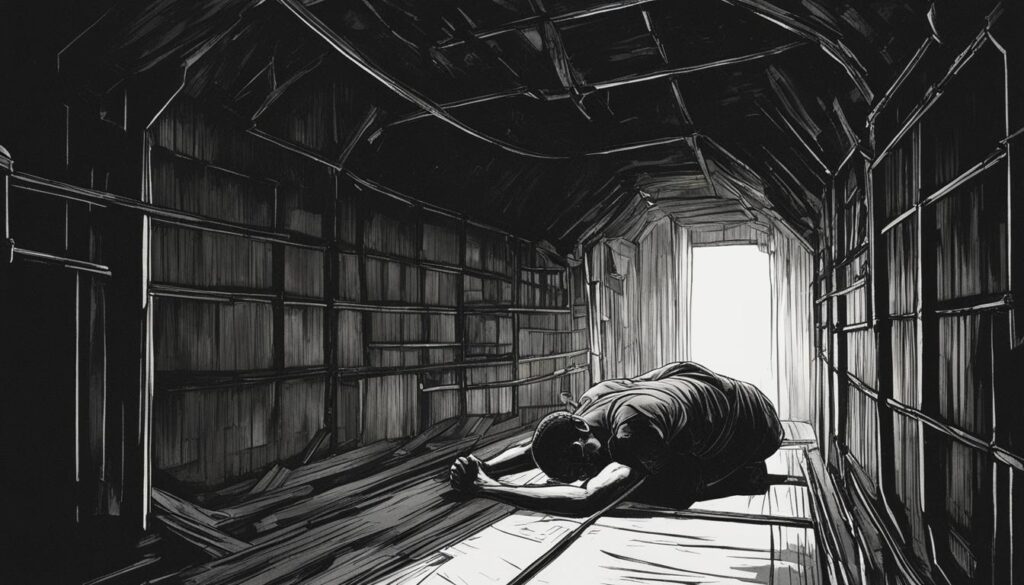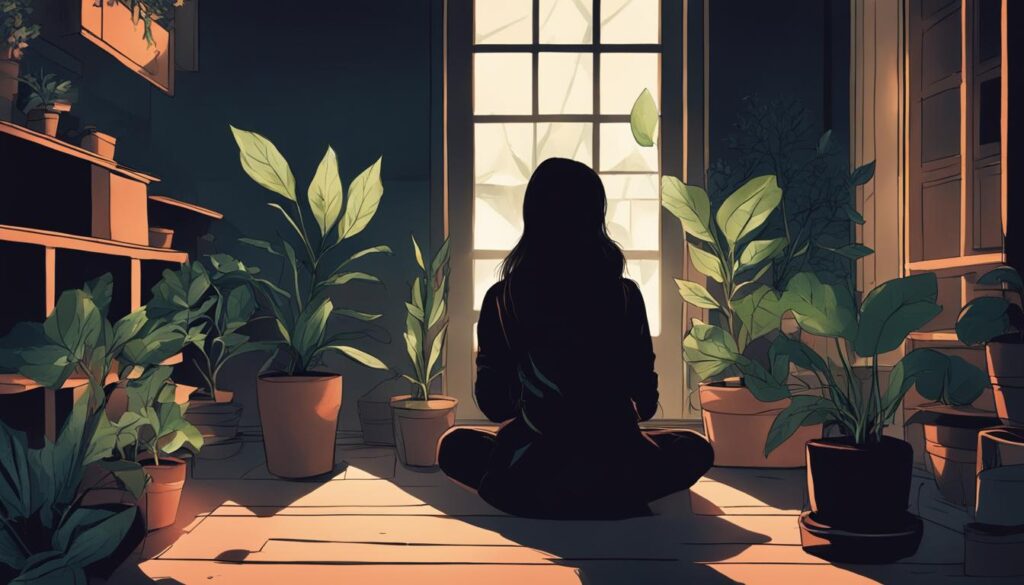Feeling stuck can be an overwhelming experience. It’s as if life has trapped you in a stagnant place, with no clear path forward. But here’s the thing: feeling stuck doesn’t just impact your emotions and mental well-being; it also takes a toll on your physical health.
As Buddhism teaches us, “You only lose what you cling to.” These words offer a profound insight into the effects of feeling stuck. When you cling tightly to a situation or mindset that no longer serves you, it can have detrimental consequences on your body.
Research has shown that feeling stuck can lead to increased stress and anxiety, which have physical manifestations. The constant state of stress can cause headaches, muscle tension, and digestive issues. It can disrupt your sleep patterns, leaving you fatigued and drained. Moreover, feeling stuck has been linked to a weakened immune system and an increased risk of chronic conditions like heart disease and depression.
Key Takeaways:
- Feeling stuck can have both emotional and physical effects on your well-being.
- Stress and anxiety associated with feeling stuck can lead to headaches, muscle tension, and digestive issues.
- Being in a stagnant state can disrupt your sleep patterns and weaken your immune system.
- Feeling stuck has been linked to an increased risk of chronic conditions like heart disease and depression.
- Recognizing the physical impacts of feeling stuck is crucial for safeguarding your overall health.
The Physical Effects of Feeling Stuck
Feeling stuck can have profound physical impacts on your body and overall health. When you experience a sense of being trapped or stagnant in life, it can lead to a variety of negative effects on your well-being.
One of the primary physical consequences of feeling stuck is chronic stress. This persistent state of stress can cause muscle tension, leading to discomfort and potential pain. Additionally, it often manifests as recurring headaches, which can further exacerbate your overall sense of unease and hinder daily activities.
The continuous activation of the body’s stress response, due to the feelings of being stuck, can also weaken your immune system. This weakened immune function makes you more susceptible to illnesses, leaving you vulnerable to infections and other health complications.
Furthermore, feeling trapped or stagnant can dramatically impact sleep quality. When you feel stuck, it’s common to experience difficulty falling asleep or staying asleep throughout the night. This can result in chronic sleep deprivation, leading to fatigue, decreased cognitive function, and impaired overall performance.
Moreover, feeling stuck can contribute to digestive issues such as stomachaches, bloating, and constipation. The mind-body connection is powerful, and when you’re mentally trapped, it can translate into physical discomfort and disruptions in your digestive system.
Perhaps most alarming is the increased risk of chronic diseases associated with feeling stuck. Studies have shown a correlation between prolonged feelings of stagnation and an elevated risk of conditions like heart disease and depression. This serves as a reminder that the impact of feeling stuck goes well beyond the immediate discomfort and reaches into long-term health consequences.
Recognizing and understanding these physical effects is crucial for taking proactive steps to address and overcome the feeling of being stuck. It’s essential to prioritize your overall health and well-being by implementing strategies that promote personal growth, emotional well-being, and a sense of purpose.

| Physical Effects of Feeling Stuck | Consequences |
|---|---|
| Muscle tension | Discomfort, pain |
| Headaches | Impaired daily functioning |
| Weakened immune system | Increased susceptibility to illnesses |
| Poor sleep quality | Fatigue, decreased cognitive function |
| Digestive issues | Stomachaches, bloating, constipation |
| Increased risk of chronic diseases | Heart disease, depression |
Strategies for Overcoming Feeling Stuck
Overcoming feeling stuck is crucial for your overall well-being. When you find yourself trapped in a state of stagnation, it’s important to take proactive steps to break free and move forward in life. Here are some strategies to help you overcome that feeling of being trapped:
- Self-Reflection: Take the time to evaluate your current situation and identify any underlying causes of feeling stuck. Reflect on your goals, values, and aspirations, and consider whether any adjustments or changes need to be made.
- Set Clear Goals: Establish specific, achievable goals that align with your values and aspirations. Break these goals down into smaller, manageable steps that will help you make progress and create a sense of accomplishment.
- Embrace Change: Don’t be afraid to step out of your comfort zone and embrace new opportunities. Change can be intimidating, but it often leads to personal growth and a renewed sense of purpose.
- Seek Support: Reach out to trusted friends, family members, or mentors who can provide guidance and support. Having a support system can help you gain perspective and navigate through challenges.
- Practice Self-Care: Prioritize your physical, mental, and emotional well-being. Engage in activities that bring you joy and relaxation, and make sure to take care of your physical health through exercise, nutritious eating, and adequate rest.
By implementing these strategies, you can start breaking free from stagnation and create a pathway towards personal growth and fulfillment.

| Strategy | Description |
|---|---|
| Self-Reflection | Take time to evaluate your current situation and identify underlying causes of feeling stuck. |
| Set Clear Goals | Establish specific, achievable goals that align with your values and aspirations. |
| Embrace Change | Step out of your comfort zone and embrace new opportunities for personal growth. |
| Seek Support | Reach out to trusted friends, family members, or mentors for guidance and support. |
| Practice Self-Care | Prioritize your physical, mental, and emotional well-being. |
The Power of Mindfulness and Compassion
Mindfulness and compassion can be powerful tools in overcoming feeling stuck. When we feel trapped or stagnant in life, it is often because our minds are filled with negative thoughts and judgments. Mindfulness practices can help us break free from this cycle by allowing us to pay attention to the present moment without judgment.
Mindfulness involves cultivating awareness and acceptance of our current circumstances, which allows us to see things more clearly and make conscious choices. By staying present, we can begin to notice the patterns and habits that keep us feeling stuck and take steps towards breaking free.
Compassion plays a vital role in this process as well. When we approach ourselves and others with compassion, we create a space of understanding and empathy. This mindset allows us to let go of rigid expectations and judgments, opening up new possibilities for growth and personal transformation.
Buddhist teachings have long emphasized the importance of mindfulness and compassion for personal growth. By incorporating these practices into our daily lives, we can break free from feeling trapped and cultivate a greater sense of peace and fulfillment.
Here are a few mindfulness practices to help you on your journey of breaking free from feeling stuck:
- Body Scan: Take a few minutes each day to scan your body from head to toe, noticing any sensations or areas of tension. Allow yourself to fully feel and acknowledge these sensations without judgment.
- Deep Breathing: Take slow, deep breaths, focusing your attention on the sensation of the breath entering and leaving your body. This can help calm your mind and bring you back to the present moment.
- Meditation: Set aside time each day for formal meditation practice. This can involve focusing on your breath, repeating a mantra, or simply sitting in stillness and observing your thoughts without attachment.
Remember that overcoming feeling stuck takes time and patience. Be kind to yourself throughout this process and celebrate each small step forward. With mindfulness and compassion as your guiding lights, you can break free from stagnation and embrace a life of growth and possibility.

Conclusion
Feeling stuck can have detrimental effects on both your body and overall well-being. The physical impacts of feeling trapped or stagnant can lead to increased stress, muscle tension, digestive issues, sleep disturbances, and weakened immune function. Recognizing these effects is the first step toward unlocking your potential and harnessing personal growth.
To overcome feeling stuck, it’s important to engage in self-reflection and identify the underlying causes of your stagnation. Seek support from trusted individuals who can provide guidance and encouragement as you navigate through this process. Embrace change and be open to new experiences. Alongside, prioritize self-care activities that nurture your body and mind.
By utilizing these strategies, you can break free from the constraints of feeling stuck and create a path toward personal growth. Remember, your potential is limitless, and overcoming stagnation is key to unlocking it. Embrace the journey and commit to nurturing your well-being as you strive for a more fulfilled and vibrant life.
FAQ
What physical effects can feeling stuck have on the body?
Feeling stuck can cause muscle tension, headaches, fatigue, weakened immune function, sleep disturbances, and digestive issues. It can also increase the risk of chronic conditions like heart disease and depression.
How can I overcome feeling stuck?
Strategies for overcoming feeling stuck include self-reflection, seeking support, embracing change, and practicing self-care. Mindfulness and compassion can also be powerful tools in breaking free from stagnation.
Can mindfulness and compassion help with feeling stuck?
Yes, practicing mindfulness and compassion can help you cultivate awareness, acceptance, and a more open-minded mindset towards yourself and others. These practices can support your journey towards moving forward and overcoming feeling trapped.

